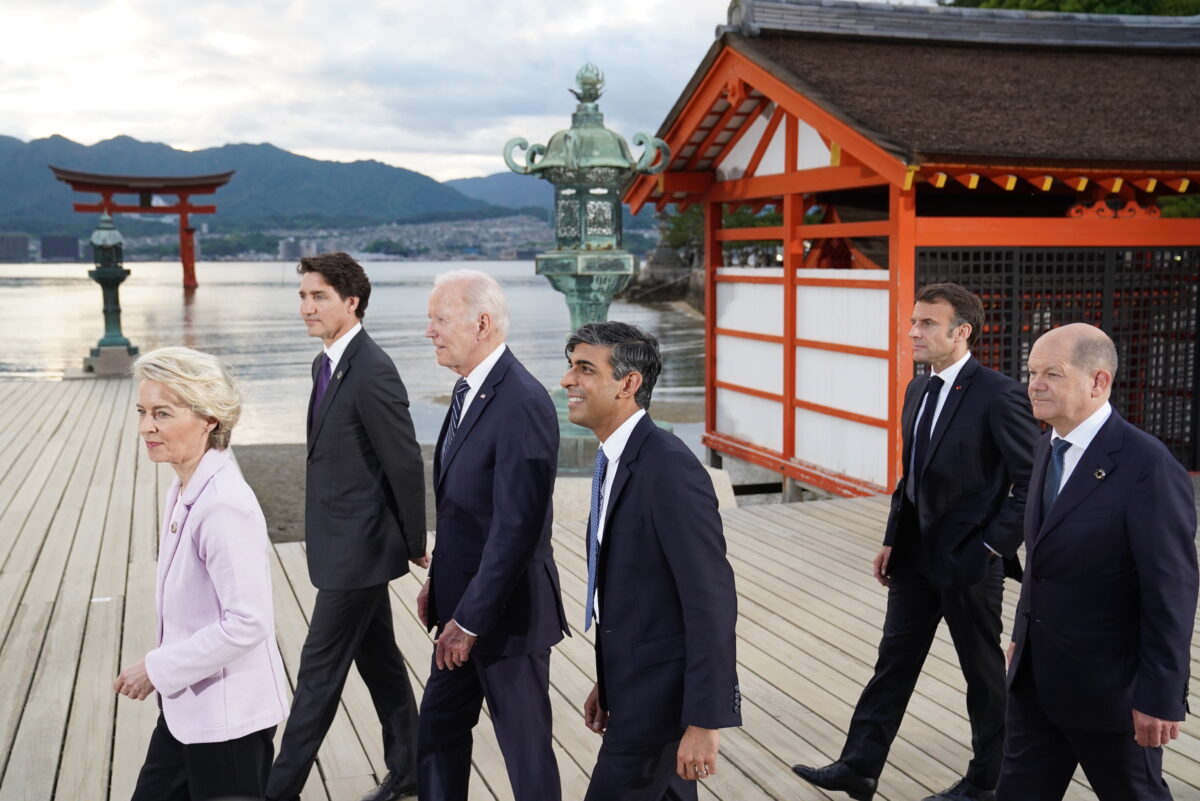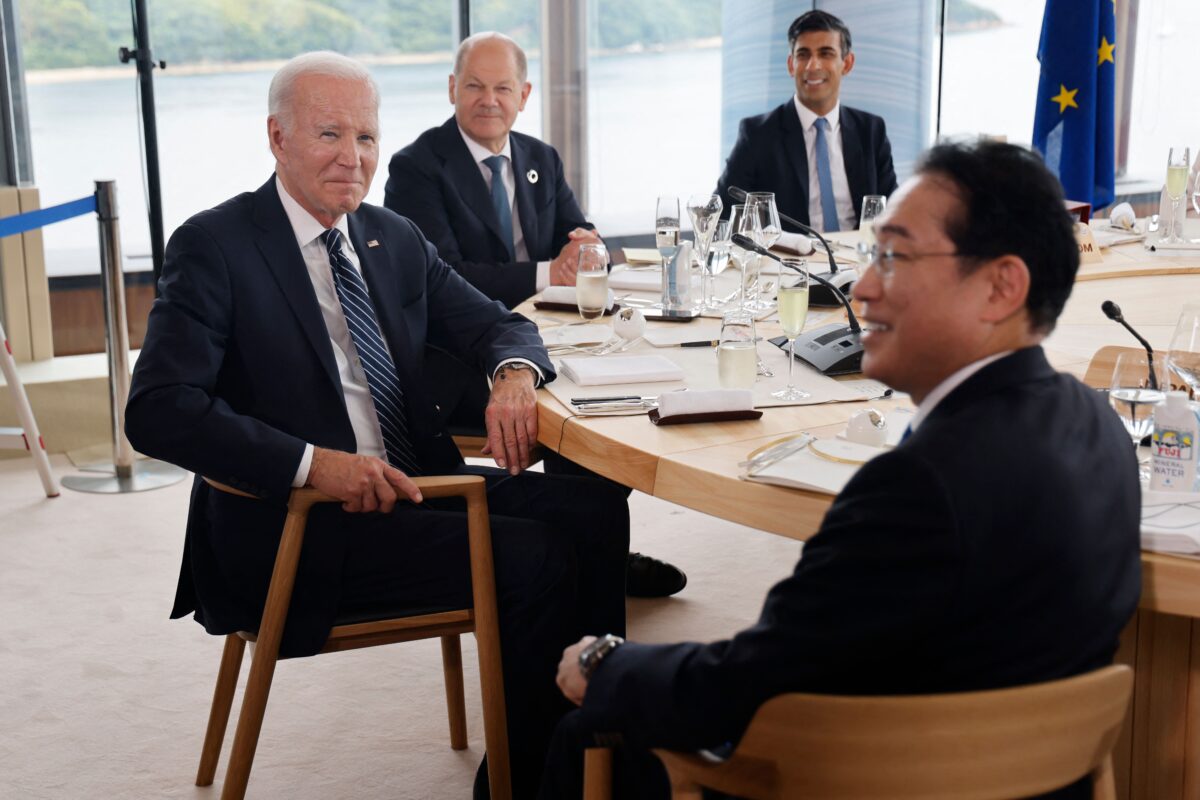


Commentary
The communist Chinese pour cold water on the actions and pronouncements of any international body that excludes China from participation.
This is particularly true of intergovernmental organizations that can greatly affect the world economy, as the so-called Group of Seven is meant to do under the leadership of the United States. Since Xi Jinping openly aspires to world leadership, Beijing is highly critical of such groups unless China directly participates—and influences—the outcomes of the various meetings.
Since China is not a G-7 member, Chinese diplomats and state-run media openly convey their disdain for the recently completed G-7 meeting in Hiroshima, Japan. And Beijing is apoplectic about Japan’s references to the “China threat” during the conference, as well as the crescendo of Japan’s actions lately to respond to that threat.
Let us examine the issue.
Initially formed in the 1970s, the G-7 is an “intergovernmental organization made up of the world’s largest developed economies: France, Germany, Italy, Japan, the United States, the United Kingdom, and Canada,” as discussed by Investopedia. According to the World Population Review, a “developed economy” is defined as “a sovereign state that possesses a mature economy and a technologically advanced infrastructure.” According to the United Nation’s Human Development Index—which measures a variety of factors such as GDP per capita to literacy rate, life expectancy, political stability, and access to electricity—any country scoring 0.8 or better (with 1.0 being a “perfect” score) is considered a developed economy.
Seven of the top 10 ranked developed countries are in Europe. The G-7 nations are ranked as follows: France (28), Germany (9), Italy (30), Japan (19), the UK (18), Canada (15), and the United States (21). China is ranked No. 79.
The G-7 meets periodically to discuss international economic and monetary issues, with the group’s presidency rotating among the members. Previously, the G-7 has addressed critical issues such as debt crises, oil embargoes and shortages, and the COVID-19 pandemic.
The G-7 leaders’ communiqué produced on May 20 lit up Xi and the communists like a Christmas tree.
The communiqué contains the standard globalist-oriented goals and objectives that have been pursued by the G-7 since its inception: a world without nuclear weapons, nonproliferation and disarmament, “resilient global food security” for all nations, transition to clean energy economies, and a pledge of $600 billion for “quality infrastructure financing” through the Partnership for Global Infrastructure Investment.
Front and center in the Regional Affairs section is a discussion of “relations with China.” The CCP must have noticed that its primacy was sending a message straight to Beijing about Chinese aggression and belligerence in East Asia, particularly in the East China and South China seas and Taiwan Strait. That this section was featured in a Hiroshima communiqué must have been particularly galling to Xi and company, given their hypersensitivity to all things Japanese. Here are a few points contained therein:
The CCP’s response to the communiqué was focused almost exclusively on the section summarized above. It should be remembered that commentary from Xi through the Chinese diplomatic corps and echoed by Chinese state-run media is in lockstep on all narratives. Anyone who deviates from the approved narrative risks being reassigned (with associated loss of face) or even “disappeared.” Thus, anything in the likes of China Daily or Xinhua about the communiqué reflects official Chinese policy.
Here are a few emotional responses by Chinese state-run media to the communiqué:
People’s Daily singled out Japan: “Making use of the G7 Hiroshima summit, the Japanese side has repeatedly fanned up the so-called ‘China threat’ to demonstrate its ‘leadership’ and the ‘solidarity’ of the G7.”
China Daily attacked the United States as the prime motivator behind the communiqué: “A series of topics attacking China at the summit, grossly interfering in its internal affairs, and blatantly challenging the post war international order fully demonstrate that the G7 has become a tool of the United States’ hegemony. … The joint statement issued at the Hiroshima Summit shows how the United States is garnering consensus in the G7 for its anti-China plot.”
People’s Daily chimed in, condemning the G-7 as a “hegemonic clique”: “A joint statement was released after the meeting, which hyped a series of China-related topics, slandered and attacked China, grossly violated China’s domestic affairs and blatantly challenged the post-war international order.”
The CCP is always on the lookout for “slander” of China from foreigners—leaders, diplomats, and media, as well as from international organizations like the G-7. Fortunately, most informed people understand what Beijing defines as slander, which most thinking people would characterize as truth.
Views expressed in this article are the opinions of the author and do not necessarily reflect the views of The Epoch Times.

